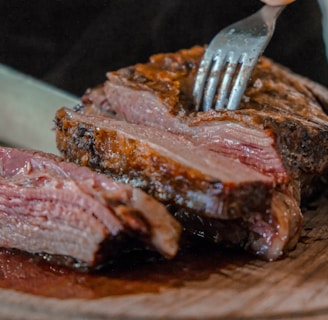"Dietary Compound in Meat and Dairy (TVA) Enhances Immune Response to Cancer, Study Finds"
"Recent research reveals the immune-boosting potential of a nutrient, Trans-vaccenic acid (TVA), found in meat and dairy products. Explore how this dietary compound strengthens the body's defense against cancer, offering promising insights for improved cancer treatments."
DR T S DIDWAL MD
11/23/20233 min read


TVA Boosts CD8+ T Cell Effectiveness: University of Chicago researchers find that Trans-vaccenic acid (TVA), present in meat and dairy, enhances CD8+ T cells' ability to infiltrate tumors and combat cancer cells.
TVA's Potential as a Supplement: Higher circulating TVA levels, linked to improved responses to immunotherapy, suggest TVA's potential as a nutritional supplement alongside clinical cancer treatments.
GPR43 Cascade Activation: TVA's unique modulation of GPR43 triggers the cAMP–PKA–CREB axis, enhancing CD8+ T cell function and revealing a targeted regulatory mechanism.
TVA in Nutrient Library Standout: In blood nutrient screening, TVA stands out by promoting IL-2 production, rescuing T cell exhaustion, and strengthening anti-tumor immunity.
TVA's Role in Tumour Growth Inhibition: Studies highlight a TVA-enriched diet's significant hindrance to immunogenic tumour growth, suggesting its translational potential in tumour treatment.
TVA's Unique Regulatory Role: Trans-vaccenic acid (TVA), prevalent in ruminant-derived foods, stands out for its distinctive regulatory role. Unlike other nutrients, TVA doesn't merely serve as an energy source; it acts as a modulator targeting the GPR43 cell-surface receptor.
GPR43 Inactivation Cascade: TVA's interaction with GPR43 initiates a cascade, activating the cAMP–PKA–CREB axis. This molecular pathway enhances the function of effector CD8+ T cells, offering a direct link between dietary components and immune response.
Blood Nutrient Compound Library: A pioneering approach involved assembling a blood nutrient compound library for meticulous screening. TVA emerged as a standout candidate, showcasing its ability to enhance IL-2 production, rescue T-cell exhaustion, and ultimately fortify anti-tumour immunity.
TVA's Impact on Tumour Growth
Real-world Implications: Studies demonstrated that a TVA-enriched diet hindered the growth potential of immunogenic tumor cells in mice. This underscores TVA's potential in translational applications for tumor treatment.
Integrated Temporal Genomics: Temporal genomics and protein phosphorylation analyses shed light on the dynamic interplay between TVA and GPR43. TVA, a long-chain fatty acid, counteracts short-chain fatty acids' effects on cAMP, enhancing CD8+ T cell function.
TVA's Impact on the Tumor Microenvironment: Zooming into the tumor microenvironment reveals that TVA-enriched diets lead to heightened functionality in tumour-infiltratingextra organismalanti-tumourunravellingtumourT-celltumourtumourtumourtumourtumoursthe CD8+ T cells. This is marked by increased cytokines, proliferation markers, and cytolytic molecules.
Targeted Amplification: TVA's distinct ability to selectively amplify the function of stimulated CD8+ T cells sets it apart from its counterparts, offering a targeted approach to bolster immune responses against tumours.
Mechanistic Nuances: TVA's extracellular signalling through the GPCR–CREB axis primarily occurs outside CD8+ T cells, influencing their activation without intracellular breakdown for metabolism.
The Future Implications of TVA
Promise for Anti-Tumour Immunity: TVA's journey from nutrient library screening to its impact on T cell function positions it as a promising subject for future research and clinical applications in the realm of anti-tumor immunity.
Unveiling a Mechanism in Human Dietary Evolution
Extrinsic Regulation: Human dietary evolution involves an extrinsic regulation mechanism through extra organismalanti-tumour TVA, contrasting with gut microbiota-derived short-chain fatty acids (SCFAs) acting as GPR43 agonists.
Molecular Effects: The study introduces a novel approach to bridge the gap between dietary choices and their molecular effects on human health and disease by comprehensively evaluating diet-derived nutrients.
Versatile Applications: TVA exhibits high translational potential in various therapeutic approaches, including immune checkpoint inhibitors, T cell engagers, CAR-T, and T cell receptor T cell therapy. Epidemiological studies hint at associations with lower adiposity, reduced diabetes risk, and systemic inflammation.
Acknowledging Complexity: While TVA shows promise, the study emphasizes the complexity of dietary choices and the need for a comprehensive understanding of diverse dietary nutrients' interactive influences on cancer risk, development, and therapy responses.
Caution with Red Meat Intake: While red meat provides TVA, caution is advised due to its positive association with various cancers. TVA supplementation is endorsed as a targeted and efficient strategy for enhancing anti-tumor immunity without broad dietary changes.
Differential Effects on Cell Types: TVA treatment affects CD4+ T cells differently from CD8+ T cells, indicating cell type-specific effects. Future studies are essential to unravellinganti-tumour GPR43's downstream effector pathways in various immune cells.
Conclusion: Paving the Way for Future Research
Avenues for Future Exploration: The study not only unravels TVA's mechanisms but also opens avenues for future research. Further exploration of TVA's structural and molecular intricacies and its interaction with GPR43 holds promise for therapeutic applications and dietary implications.
Research Article
Fan, H., Xia, S., Xiang, J., Li, Y., Ross, M. O., Lim, S. A., Yang, F., Tu, J., Xie, L., Dougherty, U., Zhang, F. Q., Zheng, Z., Zhang, R., Wu, R., Dong, L., Su, R., Chen, X., Althaus, T., Riedell, P. A., . . . Chen, J. (2023). Trans-vaccenic acid reprograms CD8+ T cells and anti-tumour immunity. Nature, 1-10. https://doi.org/10.1038/s41586-023-06749-3
Related
Medical Disclaimer
The information on this website is for informational purposes only and is not intended to be a substitute for professional medical advice, diagnosis, or treatment. Always seek the advice of your physician or other qualified health care provider with any questions you may have regarding a medical condition or treatment. Never disregard professional medical advice or delay in seeking it because of something you have read on this website.
